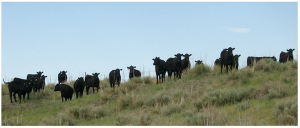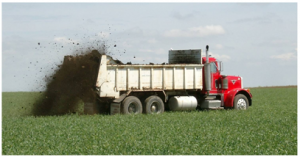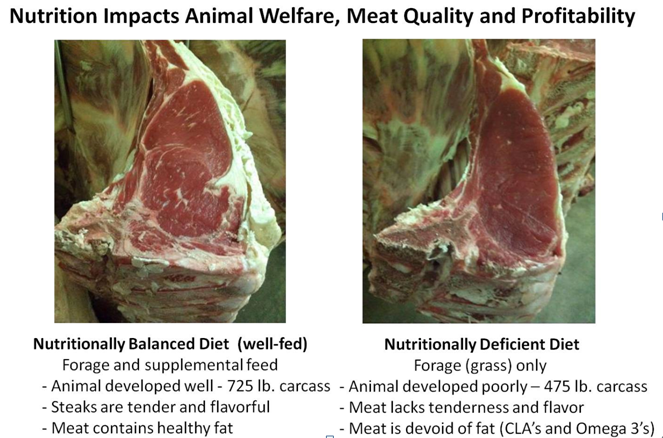NOBULL: Pastured Animals Deserve Good Care and Good Nutrition
Unlike wild animals that are basically free to roam, domesticated animals are limited to a certain space – a pasture (ranch), a feeding pen, a corral. Cattle, sheep, goats, and other domesticated ruminants are a gift to humanity. They convert plants that are inedible for humans to healthy and nutritious food. Showing our appreciation should include not only providing good care to these animals, but also a healthy and nutritious diet that promotes growth, reproduction, and good health.

The semi-arid High Plains region receives 12 to 17 inches of moisture per year on average.
Eight inches fell in the NW corner of Kansas in 2012. Virginia received 30.32 inches in 2012.
Photo Courtesy of CallicrateCattleCo.com
Many books and films talk about the evils of feeding corn. In advising writers like Eric Schlosser and Michael Pollan over the years, I have been a primary source of that message. Corn grown below the cost of production, subsidized by taxpayers, using valuable and disappearing water resources, in a chemically dependent, fossil fuel intensive, industrial model of production is wrong. Feeding this corn to livestock at levels in the diet that require antibiotics to keep the animals alive is also wrong. Family farm advocates like Michael Pollan, Eric Schlosser and Joel Salatin are correct in warning us about the destructive nature of industrial agriculture.
Feeding too much corn to ruminants is only a small part of what is wrong with our monopoly controlled food system that mines our lands, abuses animals, producers and workers, while causing unprecedented degenerative disease.

Applying cattle manure to cropland – “Our cow dung is worth more than your Wall Street stocks” – Vandana Shiva speaking to Hillary Clinton
In conversation over lunch, Temple Grandin advised, “Cattle love corn.” I responded, “Yes, they do, and men love whiskey, but too much will kill ya.” Temple is right. For centuries grains, grain crop residues, and grain byproducts have been an important part of a healthy diet for grass eating animals. Their ruminate digestive systems especially love distillers grains (barley mash from Bristol Brewing), which contain nutrients favorable to healthy rumen activity, while improving fat quality in the meat. Not only are the animals gaining more weight in receiving essential nutrients not available in the typical grass pasture, but the land is benefitting greatly from the higher nutrient manure.

Loss of fertile top soil is a major problem with the extractive, sort of strip-mining, quick-profit approach of industrial agriculture. Grazing of animals can heal this land. Pastures of low nutrient, poor quality soils, in a closed system, without supplementation, fail to provide an adequate diet for the animal or improve the health of the soil.
A more diversified model of family farm agriculture, where farm families, making a living income, producing grass, crops and livestock in the same place, best serves all of society and our future generations.